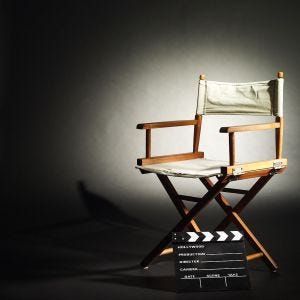Words To Remember: Lights, Camera, Action!
Ironic that today's Daily Post is about filmmaking. If you were involved in a movie, would you rather be the director, the producer, or the lead performer? (Note: you can’t be the writer!). I actually AM a director, or at least I was. I haven't directed anything since 2010, which seems like a distant memory. My last project - a music video - was completed the day before my late husband Kaz discovered he had a brain tumor. Since then, I've been writing, but not directing. What's the difference?
For starters, writing is solitary. Most of us write alone, or rather with the voices in our head to keep us company. Directing is something you must do with others. Like the captain of a ship or a general at war, directing requires not only interacting with real people, but also leading them. It also means "acting" like a director.
A well-known director once told me, "Directing is at least 75% performance." Writers usually only have to perform before they write (when they're pitching), or after they write (when they're on a press junket for their work), but rarely while they're actually writing. Directors, on the other hand, are almost always "on," whether with investors, agents, actors, the crew, producers, studio executives, festival audiences, reporters, and so on. The same director who said directing was performance also once remarked, "How in the world does one do this job without alcohol or drugs?"
Secondly, writing costs nothing. All you need is time, a computer or typewriter, or pen and paper. If you can't afford a pen and paper, you could write on a free computer at the library and use email to save your work. Or I suppose you could whittle a stick and use blackberry juice as ink like Solomon Northup's character in 12 Years a Slave. The point is you can write with absolutely no money.
You cannot, however, direct a film with no money - even if everything is donated, you're shooting in your own home and not paying anyone, money will be spent. There have been cases of people making films with as little as $7,000 (Robert Rodriguez's first film El Mariachi), but still... that's $7,000 and a WHOLE LOT of energy to call in all the favors you need to complete the film, favors worth tens (if not hundreds) of thousands of dollars. As a former professor once said, "The cheapest way to make a movie is to write one."
Third, the writing process affords flexibility, in the sense that you can change things. Your changes will have ripple effects, but that doesn't mean you can't make them. Directing, on the other hand, requires commitment to the blueprint (i.e. the script) and laser focus to keep all the moving parts together in your head (especially when shooting out-of-order). You can change things here and there, but you can't veer too far, especially once you've started filming. For example, you can't change the sex of a character, or the tone of a movie, mid-way through production (unless that's part of the story). You have to be flexible in other ways, but not in the same ways as the writer.
So, directing requires communication, performance, money, focus, and massive amounts of creative, mental and physical energy, none of which I've had much of in the past few years. I've gone from being a caregiver to a grieving widow, and now find myself in the process of redefining myself, both personally and professionally. I'm not the same person I was before Kaz. I'm not the same person I was when he was alive, or shortly after he died. I'm a combination of all of the above and something more, something new.
I've been re-editing my director's reel over the last few months, and it's been a great exercise in reflection, like a mirror to my past. Reviewing the films I wrote, directed and obsessed over for long periods. Remembering those moments and projects about which I felt such passion. As I've mentioned before, it's been challenging to feel that kind of white-hot passion again. Though I do feel myself slowly being drawn to it, like to a distant fire on the horizon of a very long night.
To answer the original question, if I were involved - when I am involved in a movie again - I will definitely be the director. Even though I haven't done it in years, I know I still have it. I love telling stories with images and sounds. I love working with actors and other professionals, each department providing its own unique, delicious ingredient to the overall piece. I adore the editing process, which feels most like the writing progress, solitary (save for your editor), flexible, and terribly creative. There's a reason why so many of us say, "I'll fix it in post."
When I get nervous about my hiatus I remember that Stanley Kubrick took 7 years between The Shining (1980) and Full Metal Jacket (1987), and even longer between the latter and Eyes Wide Shut (1999). Terrence Malick took 20 years between Days of Heaven (1978) and The Thin Red Line (1998), his second and third films respectively. They certainly didn't stop being directors just because they weren't actively directing. No doubt when they returned to the director's chair, their life experiences made them better directors.
I look forward to testing that theory. The chair awaits.


